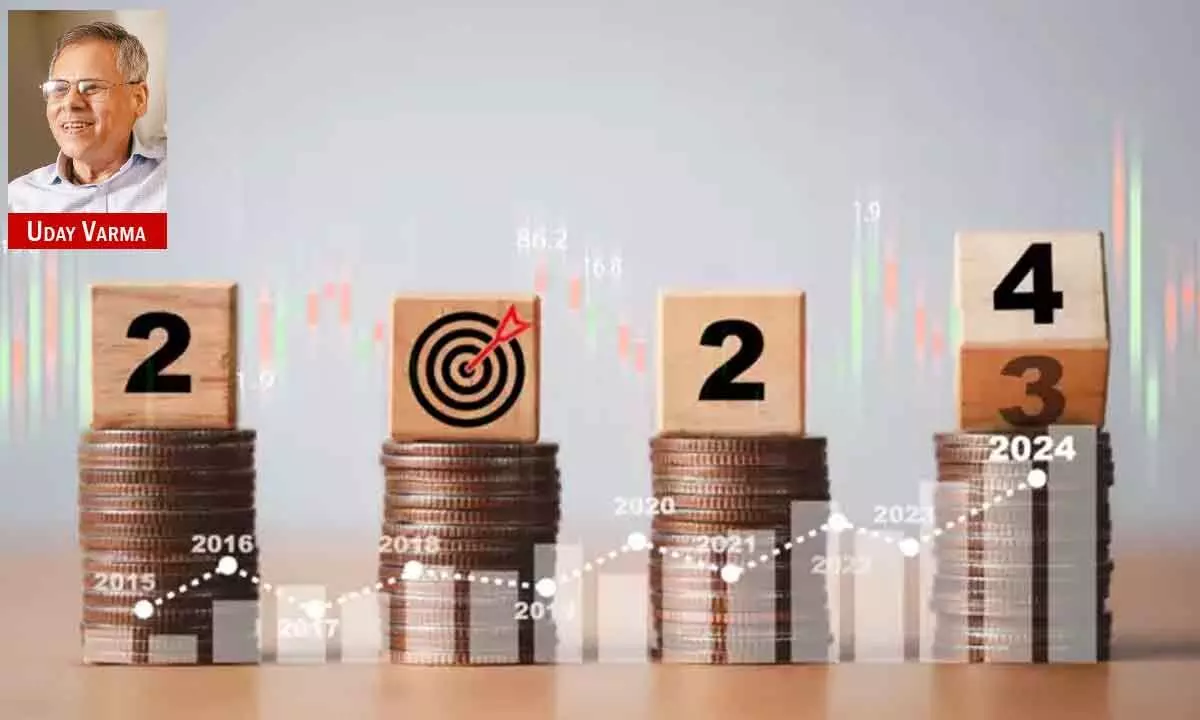A groundwork laid for future growth
While critics may call the Interim Budget 2024 ‘flat,’ it adheres to necessary conventions and paves the way for bolder announcements in the full budget to come
image for illustrative purpose

While the Interim Budget may not have delivered the sweeping changes some expected, it serves a crucial purpose within its constraints. This budget is not about grandstanding, but about laying a firm foundation for continued economic growth and stability
An interim budget is clearly and considerably constrained. It’s a budget for only a few first months of the year, seeks a vote on account to meet the financial commitments of the government. The one presented on Thursday carried the imprint of this constraint.
The critics and the opposition may call it a ‘flat budget’, ignoring the fact that interim budgets must comply with certain conventions. Finance Minister Nirmala Sitharaman has stuck to this healthy convention scrupulously. If the FM had done otherwise, and made any major policy announcement, the opposition would have rushed to Election Commission within no time and cried hoarse on this violation.
And yet, the report titled 'Indian Economy–A Review' on India’s journey for the past 10 years that was released in place of the usual ‘Economic Survey’ was as indicative of a quiet confidence and a resolute mind on India’s growth in coming years. This review is both upbeat and confident. It projects a $5 trillion economy in next three years and a $7 trillion economy by 2030.
Notwithstanding the constraints of an interim budget, FM’s speech was strong indication of not only continuing economic growth but further consolidation and acceleration of this process. All statistics given by her, inter alia, on growth rate, fiscal deficit, revenue receipts, tax collections, infrastructure investment, social sector spending wore a firm stamp of a government whose vision and priorities are clear.
Predictably, there were no major announcements on any sector including MSMEs except for an unequivocal declaration of MSMEs being an important policy priority for the government. Last year’s budget had seen a remarkable increase in budget allocation for MSME sector, witnessing a 41.6 per cent increase from the previous fiscal year. With a Rs 22,137.95 crore allocation, the government’s signal prioritising MSME then was loud and clear. This signal gets stronger, not perhaps directly but by implication and through the spin-off benefits to this sector on account of other announcements made in the speech.
Among the significant announcements made in the speech, the one on providing roof top solar panels to one crore household is clearly path -breaking. It will serve multiple purposes, the least of all additional power generation. By getting power up to 300 units free of cost, the surplus generated would convert to Rs 12,000-Rs 15,000 of income to individual households. Its environmental spin offs would be considerable. For MSMEs, the opportunities will be immense, from manufacturing of solar panels, to their installation, and maintenance, most of which will embrace this sector. It will be a major employment generating opportunity with a short gestation period. Above all, it will be an effective counter to the prevailing political culture of offering freebees that costs the tax payer so dearly.
Other announcements concerning startups are again not only desirable but very welcome. India ranking third in Innovation Index in the world, needs to harness this strength purposefully and urgently. A large number of such startups will fall under MSMEs.
The MSME sector had expected the Budget to 1) simplify the tax regime, in other words reduce tax burden on MSMEs, 2) enhance investments in crucial segments, in other words incentivise such investments; and 3) to further support startups particularly in areas like semiconductor manufacturing, 4) to reconfigure the digital commerce ecosystem to ensure its wider adoption; and of course, 5) to introduce interest subvention schemes, alleviate collateral requirements or launch initiatives like the Emergency Credit Line Guarantee Scheme. Clearly, these expectations will have to wait for full budget in the month of July, but if the tenor and sprit of FM’s speech is any indication, these expectations are likely to be substantially rewarded.
A hall mark of the budget speech was to look at the progress of the nation in terms of the new castes in the country. That we need to consider only four castes in the country namely, the poor, the youth, the women, and the farmers, that Prime Minister Modi relentlessly reminds us, is a revolutionary way of looking at the prevailing social structure of the country. It is a paradigm that may in one stroke resolve endless contradictions. In economic terms, it offers a framework and a model that is not only visionary and epoch-changing but one that will integrate and unite this country as never before.
On the balance, this interim budget was a firm and confident declaration of a government full of resolution and commitment to usher the country at the apex of global order, politically, economically and culturally. The absence of announcements, while keeping with the tradition, may appear a little disappointing to many who don’t understand the intricacies of this exercise, but the message contained in FM’s speech is loud and clear. Many of these expectations are sure to be rewarded soon, when the same government, so confident to be back in power, returns. It is a budget reflective of a quiet strength and an unflinching commitment.
(The author is the former MSME Secretary of Government of India)

